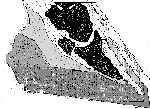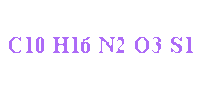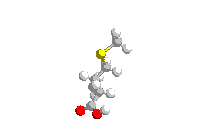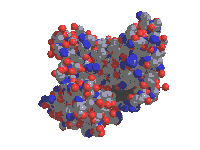|
|
Equine Hoof & Coat
Nutrition
by Antony Jones
No Hoof, No Horse
The Hoof
 |
The hoof is the horny part of a
horse's foot. The cells underlying the coronary band are where new hoof wall
grows from. The hoof wall is a keratinised structure with elastic properties.
It is estimated that a horse completely replaces it hoof once every year.
Within the hoof there are vertical tubules of horn which flex and absorb
concussion, thus reducing wear tear on the bones/ligaments/tendons of the
horse. |
The hoof can become damaged in various ways, lack of moisture physical trauma
may lead to the hoof becoming cracked broken. In these instances it would
obviously be helpful to both increase the rate of horn production improve its
quality. Can this be effected via a horse's diet? There are many different
products that are claimed to help, here I want to consider biotin and any
related issues. Biotin
-
 Biotin is part of the B
complex of vitamins that the horse undoubtedly requires. It is a crucial
co-factor in several metabolic pathways; particularly i) Protein Energy
Metabolism, and ii) hoof keratinisation. This is where the link to hoof quality
begins, a deficiency of biotin will, amongst other things, decrease the quality
quantity of hoof produced. BUT this does not necessarily indicate that feeding
it as a supplement to a horse who is not deficient, will improve said horse's
hoof. Research in pigs suggests that there may be an improvement in their horn
quality, but this is indecisive for horses. Furthermore, as with any
bio-chemical reaction, simply increasing the quantity of one agent is likely to
just cause a different agent to become the limiting factor; in other words, a
balanced diet is what is crucial. Biotin is part of the B
complex of vitamins that the horse undoubtedly requires. It is a crucial
co-factor in several metabolic pathways; particularly i) Protein Energy
Metabolism, and ii) hoof keratinisation. This is where the link to hoof quality
begins, a deficiency of biotin will, amongst other things, decrease the quality
quantity of hoof produced. BUT this does not necessarily indicate that feeding
it as a supplement to a horse who is not deficient, will improve said horse's
hoof. Research in pigs suggests that there may be an improvement in their horn
quality, but this is indecisive for horses. Furthermore, as with any
bio-chemical reaction, simply increasing the quantity of one agent is likely to
just cause a different agent to become the limiting factor; in other words, a
balanced diet is what is crucial.
- Methionine
-
 Methionine is an amino acid {a protein building block}, it is considered
essential i.e. the horse must be fed it. It is again involved in various parts
of the body's chemistry, one such part is in the production of horn for the
hoof. In fact there is evidence to show that methionine biotin are linked in
some of the same reactions, cf. limiting factors. Methionine is a candidate for
deficiency in normally fed horses since it typically only occurs at low levels
in many foodstuffs. High quality protein sources such as Dried Skimmed Milk or
Fish meal are better natural sources than simple grain herbage. Indeed there
may be a case for feeding artificial supplements of methionine after illness,
to aid recovery.
Methionine is an amino acid {a protein building block}, it is considered
essential i.e. the horse must be fed it. It is again involved in various parts
of the body's chemistry, one such part is in the production of horn for the
hoof. In fact there is evidence to show that methionine biotin are linked in
some of the same reactions, cf. limiting factors. Methionine is a candidate for
deficiency in normally fed horses since it typically only occurs at low levels
in many foodstuffs. High quality protein sources such as Dried Skimmed Milk or
Fish meal are better natural sources than simple grain herbage. Indeed there
may be a case for feeding artificial supplements of methionine after illness,
to aid recovery.
Avidin - an anti-vitamin
-
 Avidin is a
protein like molecule that effectively destroys biotin by forming a complex
with it (illustrated left). Unfortunately avidin is present in eggs, a common
pick me up fed to horses. Whilst not criticising the use of eggs as an equine
feed {I've fed them myself}, it should be noted that if feeding eggs a biotin
supplement, one may be tying up all the additional biotin being fed. Avidin is a
protein like molecule that effectively destroys biotin by forming a complex
with it (illustrated left). Unfortunately avidin is present in eggs, a common
pick me up fed to horses. Whilst not criticising the use of eggs as an equine
feed {I've fed them myself}, it should be noted that if feeding eggs a biotin
supplement, one may be tying up all the additional biotin being fed.
- Editorial Comment
- There is no substitute for a balanced diet and
good farriery. However when considering "Is my horse's diet
balanced?" it is worth considering the quality of protein that is being
fed the vitamins available and then deducing what supplements may be needed.
Feeding of a broad spectrum supplement without considering if it is required at
what level each constituent is present; may not be helpful, in fact it may be
to some detriment. This said, there is no doubt that biotin methionine
supplements do have their place in promoting healthy hooves.
Email the
Author
Visits Author's Homepage
© A.M. Jones TPR Stables

|


